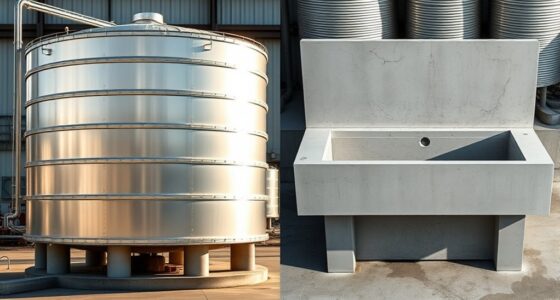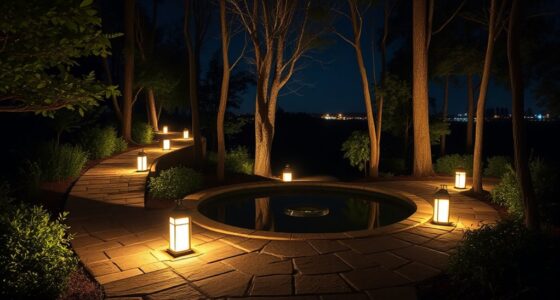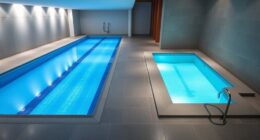To choose the best decking material, consider your style, maintenance preferences, and budget. Wood offers timeless natural beauty and durability but requires regular upkeep. Composite decks are low-maintenance and resistant to weather and pests, though they may fade over time. Stone provides elegance and durability, while concrete allows custom shapes and minimal care, but can crack. Exploring these options further will help you find the perfect match for your outdoor space.
Key Takeaways
- Wood decking offers natural beauty and durability but requires regular maintenance to prevent decay.
- Composite decking provides low maintenance and resistance to weather and pests, though it may be more costly upfront.
- Stone surfaces deliver timeless elegance and high durability but are heavy and need a strong foundation.
- Concrete decking allows for customizable designs and is low maintenance, though it may develop cracks over time.
- Material choice impacts long-term durability, aesthetic appeal, maintenance needs, and overall investment.
Natural Appeal and Durability of Wood Decking
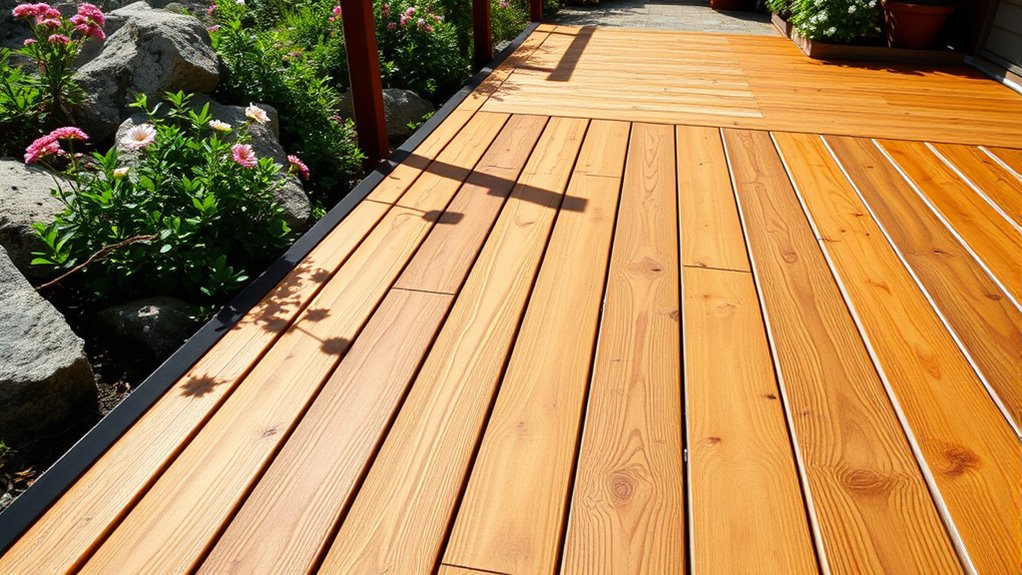
Wood decking offers a timeless natural beauty that many homeowners find appealing. Its warm tones and unique grain patterns create an inviting outdoor space that blends seamlessly with nature. When you choose wood, you benefit from its inherent strength and durability if properly maintained. Hardwood varieties like ipe or mahogany are especially resistant to wear and weather, providing longevity for your deck. Regular sealing and cleaning help preserve its appearance and prevent decay. Unlike synthetic options, wood ages gracefully, developing a charming patina over time. Its natural flexibility also allows for easier repairs when needed, keeping your deck looking great long-term. Additionally, understanding the materials used in construction can help homeowners make more informed choices about their decking options. Overall, wood combines aesthetic appeal with robust durability, making it a classic choice for many outdoor spaces.
Benefits and Considerations of Composite Materials
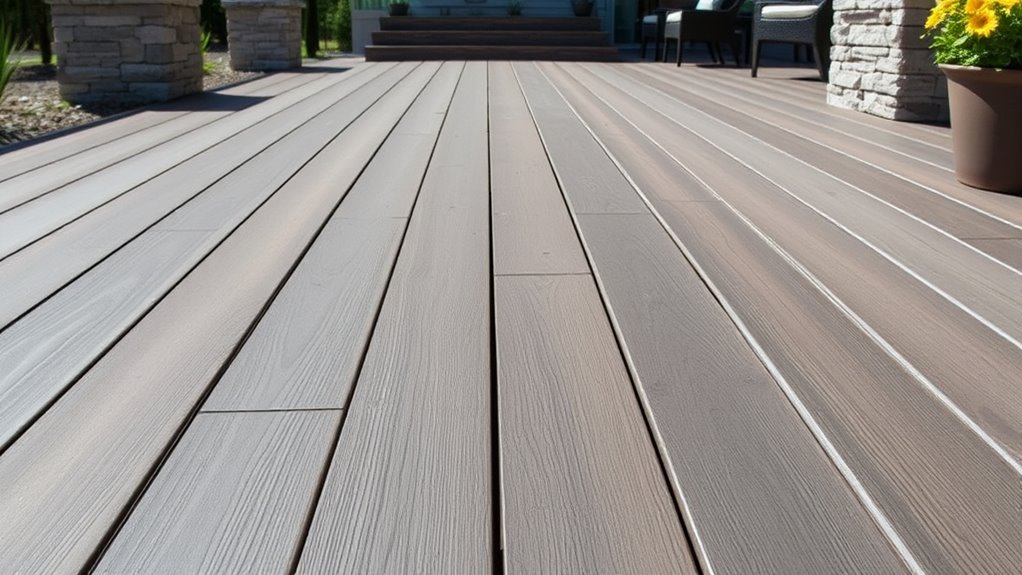
Have you considered the advantages of composite decking materials? They offer low maintenance since they don’t splinter, warp, or rot like traditional wood. You won’t need to sand, stain, or seal them regularly, saving you time and effort. Composite decks are highly durable, resisting insects and weather damage, so they last longer. They come in a variety of colors and textures, allowing you to customize your outdoor space easily. Additionally, high-efficiency models can maximize energy capture for sustainable power. However, consider that composites can be more expensive upfront than wood, and some may fade over time with prolonged sun exposure. Additionally, while they’re resistant to many issues, they can develop surface scratches or stains that require cleaning. Overall, composite materials provide a practical, long-lasting option, especially if you want a low-maintenance, durable deck.
Aesthetic and Practical Aspects of Stone Surfaces

Are you drawn to the timeless beauty of stone surfaces for your outdoor space? Stone offers a natural, elegant look that instantly elevates your deck’s aesthetic. Its variety of colors, textures, and patterns allows you to create a unique, sophisticated environment. Practically, stone is highly durable and resistant to weather, scratches, and pests, making it ideal for long-term use. Its cool surface stays comfortable underfoot during hot days. However, keep in mind that stone can be heavy and may require a strong foundation for installation. Its natural variation adds visual interest, and it ages gracefully, often developing a charming patina over time. If you value both striking appearance and resilience, stone surfaces can be an excellent choice for your outdoor decking. Choosing the right material is essential to ensure your deck remains functional and beautiful over the years.
Versatility and Maintenance of Concrete Decking
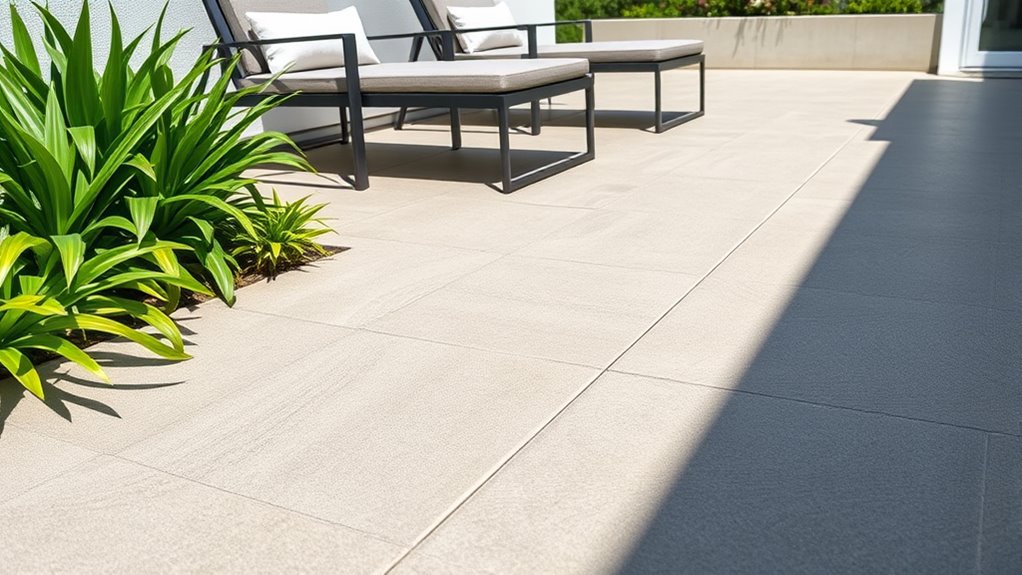
Concrete decking offers a remarkable combination of versatility and ease of maintenance, making it a popular choice for many outdoor spaces. You can customize its shape, color, and texture to match your style, whether sleek modern or rustic charm. Maintenance is straightforward—regular cleaning with water and mild soap keeps it looking fresh. Concrete resists pests, rot, and warping, unlike wood. However, cracks may develop over time, requiring sealants or repairs. Consider the following factors:
| Feature | Benefits | Considerations |
|---|---|---|
| Customization | Wide design options | Potential for cracking |
| Durability | Long-lasting, weather-resistant | Needs sealing in harsh climates |
| Maintenance | Easy cleaning and repairs | Surface may stain if unsealed |
Additionally, understanding cracking prevention techniques can help prolong the lifespan of your concrete deck.
Frequently Asked Questions
Which Decking Material Is Most Environmentally Sustainable?
You should choose composite decking for the most environmentally sustainable option. It’s made from recycled materials, reducing waste and conserving natural resources. Unlike traditional wood, it doesn’t require chemical treatments or frequent replacements, lowering environmental impact over time. While stone and concrete are durable, their production involves high energy use. By opting for composite, you minimize your carbon footprint and support eco-friendly practices in your outdoor space.
How Do Pricing and Long-Term Costs Compare Among Options?
You’ll find that wood decking costs around $15 to $25 per square foot, with maintenance expenses adding up over time. Composite decking starts at $25 to $45 per square foot but requires less upkeep, saving you money long-term. Stone and concrete options are typically $20 to $40 per square foot, with concrete offering lower maintenance costs. Overall, investing in durable materials can reduce expenses over the deck’s lifespan.
Are There Fire-Resistant Decking Alternatives Available?
Yes, fire-resistant decking options are available. You can choose materials like concrete, stone, or specially treated composites that resist ignition and slow the spread of fire. These alternatives offer enhanced safety, especially in fire-prone areas. While they might cost more upfront, they can save you money and stress in the long run by providing greater protection and peace of mind during fire season.
Which Materials Are Best for High-Traffic Areas?
For high-traffic areas, concrete is your best bet, handling up to 4,000 PSI of pressure without cracking. Its durability means you’ll spend less time repairing or replacing, saving you money in the long run. Plus, concrete resists scratches, stains, and heavy foot traffic better than wood or composite options. This makes it ideal for busy patios, walkways, or commercial spaces where longevity and low maintenance matter most.
Can Different Decking Materials Be Combined in One Design?
Yes, you can definitely combine different decking materials in one design to create a unique look. For example, you might use wood for a warm, natural feel and stone or concrete for durability and visual contrast. Just ensure the materials are compatible regarding height and expansion properties. Planning carefully and consulting with a professional can help you achieve a seamless, attractive combination that suits your space and style.
Conclusion
No matter which decking material you choose—wood for natural charm, composite for low maintenance, stone for elegance, or concrete for versatility—you get durability, style, and functionality. Each option offers unique benefits and considerations, so weigh your priorities carefully. By understanding your needs, you can select a decking that enhances your outdoor space, endures weather, and reflects your personal taste. Make a confident choice and enjoy your beautiful, functional outdoor area for years to come.


